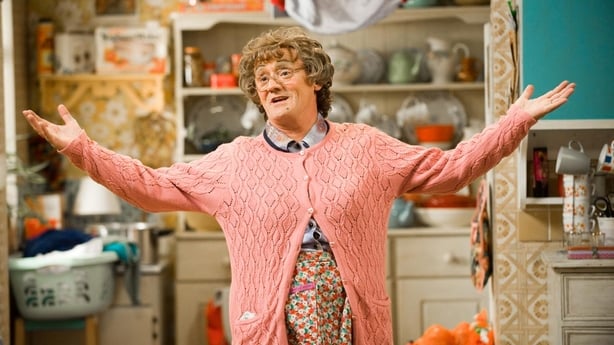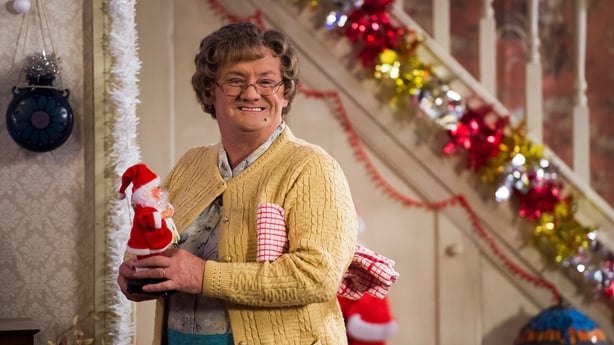Mrs Brown's Boys creator and star Brendan O'Carroll said that tax avoidance schemes should be made illegal when he was asked about the controversy surrounding the tax affairs of three of his co-stars, Fiona and Martin Delany and Patrick Houlihan, on RTÉ Radio 1 on Saturday.
O'Carroll's daughter Fiona Delany, who plays Maria Brown; her husband Martin, who plays Fr Trevor Brown; and Patrick Houlihan, who plays Dermot Brown in the hit comedy show were among those named in the so-called 'Paradise Papers' in November.
As highlighted on BBC's Panorama, the documents, which contained information detailing the tax affairs of some of the wealthiest people and companies in the world, said that the three Mrs Brown's Boys stars were paid through an offshore structure that allegedly sheltered them from paying hundreds of thousands of euro in tax.
In a strongly worded statement to Panorama at the time, Brendan O'Carroll said: "What I do know is that nobody in our employ has done anything illegal. None of our family nor any cast were listed in the Panama Papers and this feels like a witch-hunt for the sake of it.
"I also know this. Neither myself my wife or ANY company associated with Mrs Brown's Boys are now nor ever have been involved with any tax avoidance scheme. I have worked very hard for over 20 years to build this company."

When asked on RTÉ Radio 1's Marian Finucane Show about the Paradise Papers and controversy surrounding Fiona and Martin Delany and Paddy Houlihan's tax affairs, O'Carroll replied: "I felt sorry for them because they're young, and they found themselves in a situation.
"Couple of things, first of all, we didn't know things were going to be as successful as they are. So all of a sudden these youngsters had more money than they ever thought they would dream possible. And, sensibly, they went looking for advice, because, you know, money's not easy to manage and it can be quickly taken out of your hands."
"So Fiona went into one trust - she's got four kids - so that would do something for the kids," he continued.
"Mainly what they did was... When you work on the road you get paid in 'lumps', in lump sums. But you look at our tour this year, for instance. Between our tour and TV work this year we've only worked 26 weeks. So what would happen was they'd get their income in and as youngsters do they'd spend it - they'd buy a car, extension on the house, etc. And then this man - I can't remember what his name is - the taxman, would say, 'Oh by the way, you owe me this...' and they'd go, 'Oh my God, we haven't got it'. So they'd have to borrow and get the tax in.
"So what they did was they set it up in a trust so they could draw down money every month, [which] would give them a regular income. And as the money was drawn down they'd pay the full tax, insurance, etc on it.
"But unfortunately, you don't always have control over where your money gets invested. And the investment vehicle they were using was using a company that was involved in the Paradise Papers. Not illegal - they weren't doing anything illegal - and neither were the company doing anything illegal. They were doing what they would call 'tax efficient'. I would call it 'tax avoidance'. But they weren't doing anything illegal."
"I felt sorry for them too because the impression came across that they didn't pay tax," said O'Carroll. "The only money that went into that were [sic] money they earned overseas like Australia, New Zealand, etc. BBC money, RTÉ money, anything like that, that's all paid tax and insurance - that's taxed at source. At the full rate, and at a very high rate."
"I've worked out the tax rate," he told Finucane. "If we do a 15-week tour; the last four weeks are ours, the rest is the tax, the taxman, of the 15 weeks. So they all pay tax."
"I didn't go into a vehicle, because first of all, it's not in my nature," O'Carroll explained.
"I think you have to pay tax, otherwise you can't complain about the traffic lights and the roads.
"You have to pay your way. Obviously, I would like to pay less tax, like anybody else. But you have to pay tax."
"But I don't know why it's still legal," he said of tax avoidance. "That's one of the things throughout that whole episode over that couple of weeks, I kept saying, 'Why isn't anybody 'attacking' the lawmakers and saying, 'Well, make it illegal!'. It must be servicing somebody's good to be leaving it legal. Why not just make it illegal? Simple as that.
"I always say that a flat tax would be the way to do it - straight across the board, 25 pence in every pound that you earn, no loopholes, no breaks, no allowances for your pension, no allowances for... Twenty-five pence in everything that you earn goes to tax and the rest is yours. And that way you've a clear idea where you're going."
O'Carroll was then asked about his unhappiness about the manner in which the BBC had approached his daughter Fiona Delany to comment on the story.
"That morning that they doorstepped her at the BBC, we were in the middle of trying to make a comedy and it's very hard to be funny when you don't feel funny," he answered. "So they doorstepped her at the BBC in Scotland. But the other two people that were involved - Marty and Paddy - had just walked in the door straight ahead of her. Why didn't they doorstep them? Why did they pick the girl?
"And it knocked the stuffing out of her. I was dealing with a crying girl all day that day. She said, 'What did I do?'. I said, 'You didn't do anything, love. You just have to go with it'. But look, there was something like 70,000 people involved in the Paradise Papers; the unfortunate thing is that the rest of them aren't on television every Saturday.
"It led the news the next day, which was ridiculous. You know, the breaking news on BBC. They led the news."
"It's an old story," O'Carroll concluded. "It keeps popping up now and then all the time, these tax avoidance schemes. And then thing about it is, make them illegal. Just for everybody's sake, just make them illegal."
Listen back to the interview here.
The Mrs Brown's Boys Christmas Special, Mammy's Mummy, airs on Christmas Day on RTÉ One at 9pm, and on BBC One at 10pm.
The follow-up, Mrs Brown's CSI Mammy, is on RTÉ One on New Year's Eve at 9.45pm, and on BBC One on New Year's Day at 10pm.


